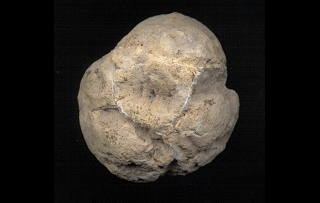Do Rocks Think?
Happy June 1 some 26 spins of the earth short of 60 revolutions of the sun since my birth and plus or minus X spins of the earth and Y revolutions about the sun before my death. Although the value of X and Y are yet to be determine, it's a good bet that the value of Y is far less than 60! And, that means I'm running out of seasons in which to figure out the mysteries of the universe and answer the ultimate question, "Why?".
During the first phase of this morning's "Triple S", I was reading a piece about computing and it mentioned that Leibnitz was a proponent of there being a reason for everything and, while we might deduce the reason for some things, only God knows the reason for everything. So, there goes any hope of ever answering the ultimate question.
Nevertheless, during the second "Triple S" phase, I got to pondering on whether only homo sapiens are capable of reasoning. Do rocks think?

My guess is that rocks do think, perhaps even more clearly than homo sapiens. I don't know how, but then we don't know exactly how homo sapiens think either!
If we accept for the moment that rocks can think, then what do they think about? Can they exercise free will?
Well, rocks are certainly not as complicated as homo sapiens. As a rule, rocks have none of those whimpy, easily altered organic bonds. They are generally a simple collection of metal oxides with strong covalent bonds in some sort of crystalline structure. Indeed, unlike homo sapiens, rocks tend to have long, stable lives. They seem to mostly just lay around, waiting for something to happen to them.
So, let's assume that rocks can think and exercise free will. What exactly is it that they can do? "Hmmm, think I'll go down to the river for a swim this afternoon." Without legs, that would require the charisma and presence of someone like William Jefferson Clinton in conjunction with the kindness of strangers.
One of the few known things that rocks can do on their own is change their shape. Cut a piece of granite into a perfect cube, launch it into outer space and after an eon or three, it will transform itself into a perfect sphere. Why? To minimize it's surface energy.
Is that free will or just thermodynamics at work?
You decide.
During the third phase of this morning's "Triple S", I cut my chin while pondering rocks. (I sure am glad that I didn't get the tools mixed up and use the razor first!)
So, that's enough thinking for today. I've got a job to do!
During the first phase of this morning's "Triple S", I was reading a piece about computing and it mentioned that Leibnitz was a proponent of there being a reason for everything and, while we might deduce the reason for some things, only God knows the reason for everything. So, there goes any hope of ever answering the ultimate question.
Nevertheless, during the second "Triple S" phase, I got to pondering on whether only homo sapiens are capable of reasoning. Do rocks think?

My guess is that rocks do think, perhaps even more clearly than homo sapiens. I don't know how, but then we don't know exactly how homo sapiens think either!
If we accept for the moment that rocks can think, then what do they think about? Can they exercise free will?
Well, rocks are certainly not as complicated as homo sapiens. As a rule, rocks have none of those whimpy, easily altered organic bonds. They are generally a simple collection of metal oxides with strong covalent bonds in some sort of crystalline structure. Indeed, unlike homo sapiens, rocks tend to have long, stable lives. They seem to mostly just lay around, waiting for something to happen to them.
So, let's assume that rocks can think and exercise free will. What exactly is it that they can do? "Hmmm, think I'll go down to the river for a swim this afternoon." Without legs, that would require the charisma and presence of someone like William Jefferson Clinton in conjunction with the kindness of strangers.
One of the few known things that rocks can do on their own is change their shape. Cut a piece of granite into a perfect cube, launch it into outer space and after an eon or three, it will transform itself into a perfect sphere. Why? To minimize it's surface energy.
Is that free will or just thermodynamics at work?
You decide.
During the third phase of this morning's "Triple S", I cut my chin while pondering rocks. (I sure am glad that I didn't get the tools mixed up and use the razor first!)
So, that's enough thinking for today. I've got a job to do!

So, I was invited into a little group to do some thinking about thinking, and in the shallow investigation of the matter, I learned that plants have activities that look suspiciously like quick decision making in communication, even when they're being eaten, which is surely a distraction of no small consequence. The thought occurred to me that if rocks could think, they might be good at working through the really really long term issues. So I googled it, and found your blog post. Now I have the answer, and don't have to think about it anymore. Thank you.
ReplyDeletehttps://www.youtube.com/watch?v=i8YnvMpcrVI